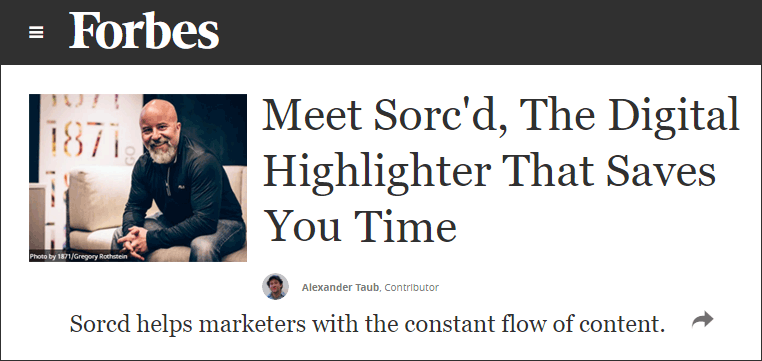How to Research Like a Journalist
 Author: Bob Girolamo
Author: Bob GirolamoThe content sphere is in flux; constantly changing. Whether you’re in marketing, writing for a company, or writing articles about specific topics as educational resources, keyword research isn’t the only type of research you’ll need to conduct. Though a focus on search has an important place in modern content creation, research that incorporates multiple credible sources is what will really set your pieces apart from the competition.If research isn’t already part of your process, it’s time for a reality check. Here’s what you need to know to get started:
Research that is timely
If you are writing a press release, blog post, or article that relates to a recent event your research should incorporate information that was posted within a reasonable timeframe. Different industries and topics dictate different terms for what constitutes “timeliness”, but consider a field like SEO—something that was relevant event a year ago may no longer be relevant.
Some of the most up-to-date sources of information include recent results on Google News, Twitter and RSS feeds to trade-specific publications such as IndustryWeek, AdAge, and Thomson Reuters. Of course, when it comes to “sources” such as Twitter, additional sources may be necessary to validate information. Creating industry-specific alerts and staying on top of timely resources will unveil information as it is made public. Being the first to report on news of interest within your industry can be considered an advantage when it comes to building thought leadership.
Exclusive journalism
Being a great researcher means first identifying primary sources to refer back to. With this in mind, create a list of trade-specific publications in your subject area.
Subscribe to email updates so that you’ll have a bird’s eye view of what’s new and interesting. Online publications that post a large quantity of news send daily digests for easy skimming. If you’re looking for even more timely news, refer once again to Twitter.
Create a list of your favorite publications, and search their followers to find the handles of their journalists. Add these individuals to your Twitter list for of-the-moment news updates. Many of these journalists make it easy to get in touch via email, sharing theirs in their Twitter bio. You can use this information to get in touch if you’d like to learn more about a story, but be judicious—most journalists don’t have time to field endless questions from readers.
Making use of materials that aren’t time sensitive
If you want information on a company’s most recent developments, it may be as simple as conducting a Google search with the terms, “[Name of Business] Press Release” or “[Name of Business] PR”. Besides a company’s own efforts to publicize their latest and greatest feats, there are many publications devoted to aggregating press releases that you could search for more information (such as Business Wire). Press releases are written in a professional language and are neutral of public opinion, which can be helpful for your research.
Using niche search engines such as Google Scholar or PubMed can help you access materials not available to the general public. The Library of Congress also has a free online database that’s easy to navigate. While you’re at it, don’t forget about your local library, which provides free access (when you sign up for a library card) to dozens of informational databases. At any rate, when using materials taken from scholarly publications, it is important to remember that these materials are not subject to frequent updates. You will have to judge for yourself whether a study from the early 2000s is still relevant for whatever topic you’re writing about.
Handling biases
Your topic is best served if you attack it from many angles. For example, don’t just source information from the New York Times: go to CNN, USA Today, Newsweek, and Bloomberg. Read their official publications, the press releases companies released to the news giants, and possibly even their social media posts. Attempt to contact the journalists themselves with your questions for more credibility, if necessary.
If you’re not finding enough diversity with national publications, consider local papers and local papers’ social media handles. Go to conventions that are popular with the brand you’re studying. Go to their competitor’s blogs for other ideas.
No matter how you go about it, try to view your subject from many different lenses.
Alternative search engines
Google may be the mainstream, go-to search engine, but the web has many estuaries in its content river. If you follow some of these less traveled paths, it will lead you to the under-represented hovels the internet hides its gold in.
Some alternative search engines are owned by Google-like Blink. Others are owned by different companies, like Bing, DuckDuckGo, and Dogpile. Some are private deep web projects like Tor Browser (which is free to download and helps you to search the .onion level of the internet). Some of these are highly intelligent and will deeply analyze your query for you to save you some of the time in shaping your query. Another option, Wolfram Alpha’s search engine, allows you to enter in the name of a company and it will spit back its sector, latest stock trade price, and executives names—along with a brief bio. Find at least one other search engine that you like and weigh the differences in your research results. Queries from various sources form a well-rounded view and provide backlink material that others aren’t necessarily vying for.
Final thoughts:
Research at any level must be comprehensive to be valuable. Don’t fill your writing with filler that takes away from the experience of your human reader.
By being purposeful in your research, you’ll be a better content marketer overall.







